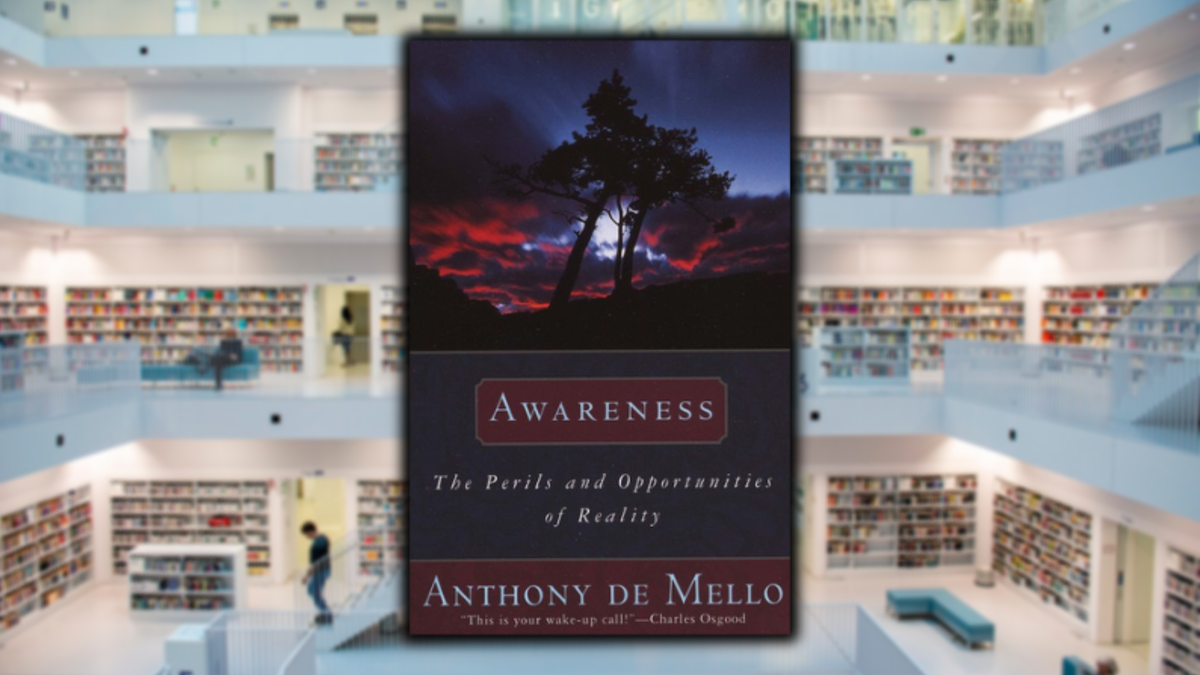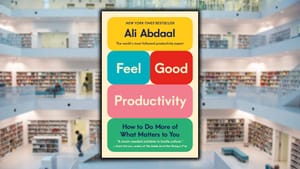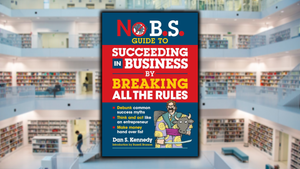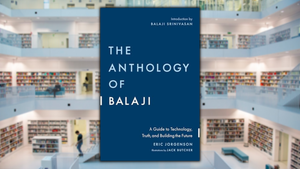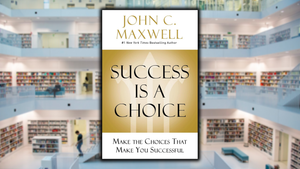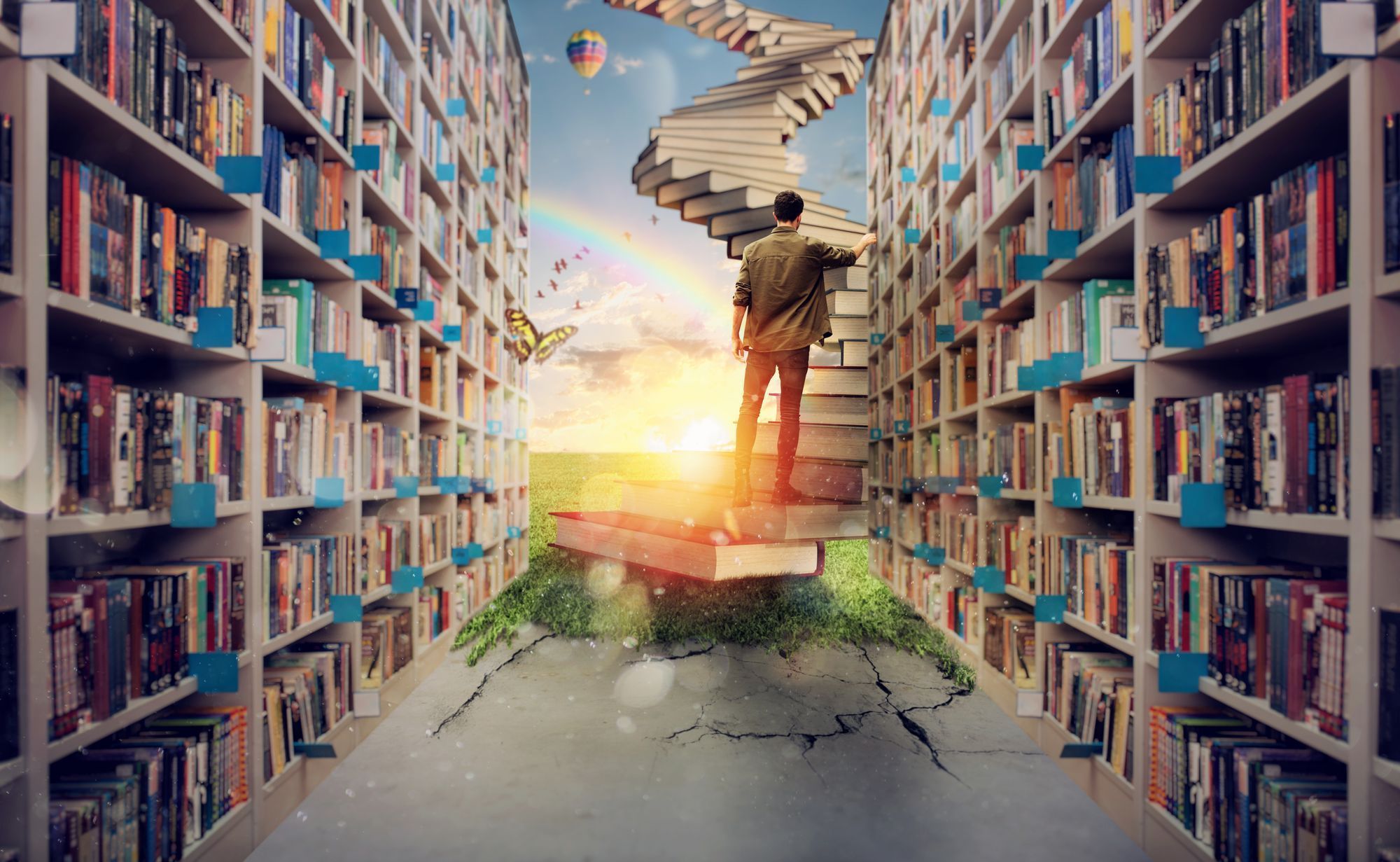
This Book is For:
*Readers who love discovering books that deliver lightning bolts of inspiration and insight that will change the way they think forever.
*People who feel as though they are lacking a certain sense of stability in their lives, and who want to find ways of coping with the rapid pace of change and restoring their equanimity and peace.
*Anyone who wants to see further and deeper into the true nature of reality, with the help of one of the most humane, supportive, and surprising spiritual teachers the world has ever known.
Summary:
“But I’ll promise you this: I have not known a single person who gave time to being aware who didn’t see a difference in a matter of weeks. The quality of their life changes, so they don’t have to take it on faith anymore. They see it; they’re different. They react differently. In fact, they react less and act more. You see things you’ve never seen before."
-Anthony de Mello
What does it feel like to imagine oneself as intimately connected with Reality - with everything that exists - and to live with your eyes, and your heart, wide open?
Anthony de Mello points the way to an understanding - and awareness - of what such a fully realized life feels like, and just like life, this book is full of surprises. Awareness began as a series of lectures that were later combined into a book, so it helps to imagine him speaking to an audience while you read it, and that you are in that audience.
De Mello was a Jesuit priest and spiritual teacher and he uses stories, parables, jokes, and striking insights - which he combines with his deep humanity and infinite care and affection - to wake people up to the life that's been sitting right in front of them the whole time they've been alive.
It's a favorite book of Tim Ferriss, who has mentioned it quite often on his extremely popular podcast. Awareness is also one of only two books on the recommended reading lists of both Eckhart Tolle and Naval Ravikant. The other book is the Tao Te Ching, which places Awareness in excellent company!
De Mello's whole "project" is to get you to see Reality in a completely different way - the way you would if the "doors of perception" were cleansed. Mainstream psychology and what passes for religion these days don't really solve your problems; they just exchange your problems for other problems.
It's like the story of the man traveling with a brown package on his lap, who was asked by the train's conductor what was inside. The man explains that it is an unexploded bomb he found in his garden and that he's taking it to the police station.
The conductor says, "Oh! You don't want to carry that around on your lap! Put it under your seat!"
Other approaches and "fixes" just transfer the bomb from our lap to underneath our seat. In contrast, the following graphic explain's de Mello's approach:
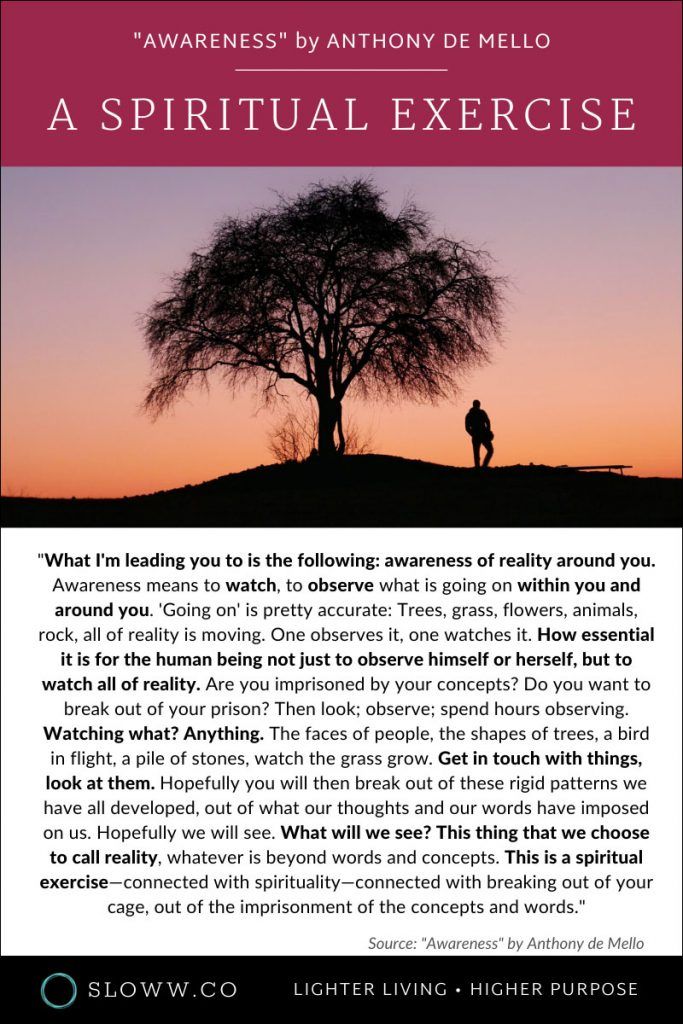
Waking up to Reality and Life itself isn't "supposed" to be comfortable. Nobody likes being woken up! But Reality is so much more miraculous and incredible than most of us ever glimpse on a daily basis, and waking up is very much like breaking out of prison.
We're imprisoned in our concepts, our ideas, our blind beliefs, and prejudices, but to break out of this prison and actually experience life, the first step is to realize that you are in prison and that there is a way out. Anthony de Mello shows us all the way out in this book.
Importantly, you have to wake up, not anyone else. It's you. It's always been you, and we can never shift the responsibility of waking up onto someone else.
We never go to the doctor and get a prescription for our neighbor! We go to the doctor to get a prescription for ourselves! All change begins with you, and when you change how you look at things, the things you look at change.
It's this relentlessly curious self-observation that de Mello was known for, and his gift was to inspire feelings of care, connection, and curiosity in all of his listeners and readers. He taught that awareness isn't something "extra" that you have to add to your to-do list. It's not a task, or an obligation, but a way of seeing, and a way of bringing yourself to life.
De Mello taught that you don't have to "add" anything to your life to make it - or yourself, for that matter - into everything it could be; rather, it's a process of subtraction, of dropping your attachments, your labels, your concepts, and all the other obstructions to your happiness, which is, after all, your natural state.

Key Ideas:
#1: How Much Truth Can You Take Without Running Away?
“The most difficult thing in the world is to listen, to see. We don't want to see. Do you think a capitalist wants to see what is good in the communist system? Do you think a communist wants to see what is good and healthy in the capitalist system? Do you think a rich man wants to look at poor people? We don't want to look, because if we do, we may change.
We don't want to look. If you look, you lose control of the life that you are so precariously holding together. And so in order to wake up, the one thing you need the most is not energy, or strength, or youthfulness, or even great intelligence. The one thing you need most of all is the readiness to learn something new.
The chances that you will wake up are in direct proportion to the amount of truth you can take without running away. How much are you ready to take? How much of everything you've held dear are you ready to have shattered, without running away?"
Sleeping is synonymous with stagnation, with staying the same. Waking up implies a change of state, moving from one state of being into another that's closer to reality. What's more, waking up doesn't usually happen without a significant amount of discomfort and questioning of previously held beliefs.
Waking up is also about seeing. Importantly, it's about looking at what you've always been looking at, but seeing it differently. Seeing it in its true form. Because reality is always new, always changing, waking up means that you will constantly be evolving and growing over the course of your life, always ready to unlearn and discard what you've long believed to be true.
Now, that doesn't mean you'll never feel strongly about things ever again, or that you'll never take a courageous stand for some deep cause, but rather that you're likely to have "strong beliefs, loosely held."
Living in a state of wakefulness means believing in something completely and totally, but being always willing to shed that belief once you learn that it's actually false, or that it needs to be updated. Sleeping people never update their beliefs.
And you really have to keep updating your beliefs, because there's virtually nothing you can say about reality that will be totally true in the next moment. Once you try to fix a belief in time, it dies.
The only universal constant is change, and to be able to flow with that change and adapt to it and live with it means acquiring an openness and a flexibility that are prerequisites for true wakefulness. You can't run away from it, but you do have to move.
#2: Uninterrupted Happiness is Uncaused
“Do you want to be happy? Uninterrupted happiness is uncaused. True happiness is uncaused. You cannot make me happy. You are not my happiness. You say to the awakened person, 'Why are you happy?' and the awakened person replies, 'Why not?' Happiness is our natural state.
Happiness is the natural state of little children, to whom the kingdom belongs until they have been polluted and contaminated by the stupidity of society and culture.
To acquire happiness you don't have to do anything, because happiness cannot be acquired. Does anybody know why? Because we have it already. How can you acquire what you already have?
Then why don't you experience it? Because you've got to drop something. You've got to drop illusions. You don't have to add anything in order to be happy; you've got to drop something. Life is easy, life is delightful. It's only hard on your illusions, your ambitions, your greed, your cravings. Do you know where these things come from? From having identified with all kinds of labels!”
Your happiness is like a clear blue sky covered over with gray clouds of unhappiness. The blue sky is your natural state, and once you remove those obstructions, your fundamental peace, happiness, and perfection will be revealed. You don't need to "acquire" anything to become happy; you simply need to shed what makes you unhappy.
It's the same with money. The question of whether money can "buy" happiness is nonsensical; what money can do, however, is to remove the sources of unhappiness. It's the exact same thing. Buying "stuff" is unlikely ever to create some state of bliss within you that was never there before, but removing the stress and anxiety of not having enough, or being unable to fulfill your obligations is likely to make you a whole hell of a lot happier!
It's important, though, to realize that you can be happy for no reason at all. Indeed, it's one of the most transformational mental shifts you can ever make, because when you're happy for no reason, your happiness can never be taken away from you.
No longer will you be happy or sad "because" someone said this or that to you, or because something or other happened and you feel really good about it, or awful, or whatever the case may be. When you realize that it's possible to be happy for no reason - indeed, that it's your natural state and birthright - the entire sky opens up to you.
The key to your happiness is always within you - it always has been and always will be. Again, that's not to say that you won't be happy or sad because of external events ever again (No, you should celebrate your wins! You may feel sad when something awful happens to you). Still, your fundamental, inalienable right to peace and happiness will never be disturbed.
The whole process is so easy but, at the same time, so incredibly difficult. You don't have to "do" anything, but how hard is it for people to do nothing! It's so hard! The key, however, is not to add, but to remove. To drop the sources of unhappiness. As Anthony de Mello advises:
“Understand the obstructions you are putting in the way of love, freedom, and happiness and they will drop. Turn on the light of awareness and the darkness will disappear."
#3: Awareness is NOT a Goal
“Some people see awareness as a high point, a plateau, beyond experiencing every moment as it is. That’s making a goal out of awareness. But with true awareness there’s nowhere to go, nothing to achieve.
How do we get to this awareness? Through awareness. When people say they really want to experience every moment, they’re really talking about awareness, except for that ‘wanting.’ You don’t want to experience awareness; you do or you don’t."
If you were to say that you are trying to become happier, or more peaceful, or more serene, what you're actually doing is defining yourself as someone who is unhappy, violent, and restless. There's always going to be this unbridgeable gap between where you are and where you say you're going. You'll never get there.
Likewise, with awareness, when you say you want to become more aware, or you want to wake up, you're dead before you even started. Awareness - like freedom - comes at the beginning, never at the end. The only way to be more aware is to be aware! It's instantaneous! It's now!
You're either aware now, free now, or you never will be. Making it a goal just pushes it into the future when actually, awareness is yours right now.
#4: Spirituality is the Most Practical Thing in the Whole Wide World
“I challenge anyone to think of anything more practical than spirituality as I have defined it - not piety, not devotion, not religion, not worship, but spirituality - waking up, waking up!
Look at the heartache everywhere, look at the loneliness, look at the fear, the confusion, the conflict in the hearts of people, inner conflict, outer conflict. Suppose somebody gave you a way of getting rid of all of that?
Suppose somebody gave you a way to stop that tremendous drainage of energy, of health, of emotion that comes from these conflicts and confusion. Would you want that?
Suppose somebody showed us a way whereby we would truly love one another, and be at peace, be at love. Can you think of anything more practical than that?
But, instead, you have people thinking that big business is more practical, that politics is more practical, that science is more practical. What's the earthly use of putting a man on the moon when we cannot live on the earth?"
#5: The Highest Knowledge of God
“The highest knowledge of God is to know God as unknowable. There is far too much God talk; the world is sick of it. There is too little awareness, too little love, too little happiness, but let's not use those words either. There's too little dropping of illusions, dropping of errors, dropping of attachments and cruelty, too little awareness. That's what the world is suffering from, not from a lack of religion."
Reality can never be defined as a concept. Reality just is, and there's nothing we can say about it that will come close to pinning it down - "God talk" included. Essentially, you can write all the holy books you want - and shout at as many "unbelievers" as you want - but it will never change the fact that Reality (God, the Universe, etc.) is change itself.
But take a look around and what do you see? Everyone's talking about "God" and "salvation" and all the rest of it, yet hardly anyone is extending unconditional love to everyone with whom we share this Reality. That's totally backward. "Religion" is everywhere, but love is not.
Spiritual teachers like de Mello can never tell you what God is; they can only give you hints, and pointers - in a word, awareness. They can never hand you the complete truth; they can simply make you aware that Reality can never be frozen into a concept, as de Mello explains in the quote below.
Trying to pin Reality down into a concept is like trying to stop a symphony because you think you've found the perfect note! Here's de Mello:
“The moment you put things into a concept, they stop flowing; they become static, dead. A frozen wave is not a wave. A wave is essentially movement, action; when you freeze it, it is not a wave. Concepts are always frozen. Reality flows."
#6: The Dancer and the Dance
“Have you ever experienced your is-not-ness? In the East, we have an image for this. It is the image of the dancer and dance. God is viewed as the dancer and creation as God's dance. It isn't as if God is the big dancer and you are the little dancer. Oh no. You're not a dancer at all. You are being danced! Did you ever experience that?"
Most people think they came "into" this world, but that's not true. They came out of it. You are something the universe is "doing," in the same way that a wave is something the whole ocean is doing. How incredible!
Waves cannot exist without an ocean to create them, and people cannot exist without a universe from which they emerge.
This is our fundamental reality: complete and total identification with everything that exists. Everything.
Of course, there are different images and phrases that illustrate this reality - such as the dancer and the dance - but the fact is that neither can exist without the other. The dancer and the dance create each other, in the same way that you can't have "East" without "West," "Hardness" without "Softness," or "Light" without "Darkness."
Now, is it possible to translate this intellectual image into a visceral experience?
What does it feel like to know that you are intimately connected with everything that exists - that you are the total Universe and all the galaxies and everything - and that fundamentally, at the very basis of all reality, everything is actually okay?
In the awakened state, it feels like freedom. It feels like love. It feels like...awareness.

Book Notes:
“Life is a banquet. And the tragedy is that most people are starving to death.”
“Spirituality means waking up. Most people, even though they don't know it, are asleep. They're born asleep, they live asleep, they marry in their sleep, they breed children in their sleep, they die in their sleep without ever waking up. They never understand the loveliness and the beauty of this thing that we call human existence."
“Even the best psychologists will tell you that, that people don't really want to be cured. What they want is relief; a cure is painful."
“The whole world is crazy. Certifiable lunatics! The only reason we're not locked up in an institution is that there are so many of us."
“When you renounce something, you're stuck to it forever. When you fight something, you're tied to it forever. As long as you're fighting it, you are giving it power. You give it as much power as you are using to fight it."
“It’s not that we fear the unknown. You cannot fear something that you do not know. Nobody is afraid of the unknown. What you really fear is the loss of the known. That's what you fear."
“I dare not stop to think, because if I did, I wouldn’t know how to get started again.”
“Are you enlightened?”
“How would I know?”
“The trouble with people is that they're busy fixing things they don't even understand. We're always fixing things, aren't we? It never strikes us that things don't need to be fixed. They really don't. This is a great illumination. They need to be understood. If you understood them, they'd change."
“As soon as you look at the world through an ideology you are finished. No reality fits an ideology. Life is beyond that. That is why people are always searching for a meaning to life. But life has no meaning; it cannot have meaning because meaning is a formula; meaning is something that makes sense to the mind.
Every time you make sense out of reality, you bump into something that destroys the sense you made. Meaning is only found when you go beyond meaning. Life only makes sense when you perceive it as mystery and it makes no sense to the conceptualizing mind.“
“Eternity is right now.”
"Many wrongly assume that not having negative feelings like anger and resentment and hate means that you do nothing about a situation. Oh no, oh no! You are not affected emotionally but you spring into action."
“We never feel grief when we lose something that we have allowed to be free, that we have never attempted to possess."
“There’s only one reason why you're not experiencing bliss at this present moment, and it's because you're thinking or focusing on what you don't have. Otherwise, you would be experiencing bliss."
“There’s not a single evil in the world that you cannot trace to fear. Not one."
“When I’m listening to you, it's infinitely more important for me to listen to me than to listen to you. Of course, it's important to listen to you, but it's more important that I listen to me. Otherwise, I won't be hearing you. Or I'll be distorting everything you say. I'll be coming at you from my own conditioning."
“I got a pretty good education. It took me years to get over it.”
“Negative feelings are in you. No person on earth has the power to make you unhappy. There is no event on earth that has the power to disturb you or hurt you. No event, condition, situation, or person. Nobody told you this; they told you the opposite. That's why you're in the mess that you're in right now. That is why you're asleep. They never told you this. But it's self-evident."
“When you change, everything changes.”
“I want to tell you exactly how you're expected to be and how you're expected to behave, and you'd better behave as I have decided or I shall punish myself by having negative feelings. Remember what I told you: everybody's a lunatic."
“Awakening should be a surprise. When you don't expect something to happen and it happens, you feel surprise. When Webster's wife caught him kissing the maid, she told him she was very surprised. Now, Webster was a stickler for using words accurately (understandably, since he wrote a dictionary), so he answered her, 'No, my dear, I am surprised. You are astonished!'"
"Nobody was mean to you. Somebody was mean to what he or she thought was you, but not to you. Nobody ever rejects you; they're only rejecting what they think you are.
But that cuts both ways. Nobody ever accepts you either. Until people come awake, they are simply accepting or rejecting their image of you. They've fashioned an image of you, and they're rejecting or accepting that.
See how devastating it is to go deeply into that. It's a bit too liberating. But how easy it is to love people when you understand this. How easy it is to love everyone when you don't identify with what they imagine you are or they are. It becomes easy to love them, to love everybody."
“One cannot say anything about the awakened state; one can only talk about the sleeping state. One hints at the awakened state. One cannot say anything about happiness. Happiness cannot be defined. What can be defined is misery. Drop unhappiness and you will know. Love cannot be defined; unlove can. Drop unlove, drop fear, and you will know. We want to find out what the awakened person is like. But you'll know only when you get there."
“No theory adequately covers reality. So I can speak to you, not of the truth, but of obstacles to the truth. Those I can describe. I cannot describe the truth. No one can.
All I can do is give you a description of your falsehoods, so that you can drop them. All I can do for you is challenge your beliefs and the belief system that makes you unhappy. All I can do for you is help you to unlearn.
That's what learning is all about where spirituality is concerned: unlearning, unlearning almost everything you've been taught. A willingness to unlearn, to listen."
“The fact is that you're surrounded by God and you don't see God, because you 'know' about God. The final barrier to the vision of God is your God concept. You miss God because you think you know."
“The poor little fish in the ocean says, 'Excuse me, I'm looking for the ocean. Can you tell me where I can find it?'"
“Happiness releases you from self. It is suffering and pain and misery and depression that tie you to the self. Look how conscious you are of your tooth when you have a toothache. When you don't have a toothache, you're not even aware you have a tooth, or that you have a head, for that matter, when you don't have a headache. But it's so different when you have a splitting headache.
So it's quite false, quite erroneous, to think that the way to deny the self is to cause pain to the self, to go in for abnegation, mortification, as these were traditionally understood. To deny the self, to die to it, to lose it, is to understand its true nature. When you do that, it will disappear; it will vanish."
“I am He who is; you are she who is not.”
“You thought you were the dancer; you now experience yourself as the dance.”
“Who says that worrying doesn’t help? It certainly does help. Every time I worry about something, it doesn’t happen!”
“Do not suppress desire, because then you would become lifeless. You'd be without energy and that would be terrible. Desire in the healthy sense of the word is energy, and the more energy we have, the better. But don't suppress desire, understand it.
Understand it. Don't seek to fulfill desire so much as to understand desire. And don't just renounce the objects of your desire, understand them; see them in their true light. See them for what they are really worth.
Because if you just suppress your desire, and you attempt to renounce the object of your desire, you are likely to be tied to it.
Whereas if you look at it and see it for what it is really worth, if you understand how you are preparing the grounds for misery and disappointment and depression, your desire will then be transformed into what I call a preference. When you go through life with preferences but don't let your happiness depend on any one of them, then you're awake."
“The one who would be constant in happiness must frequently change.”
-Confucius
“Until somebody told you you wouldn’t be happy unless you were loved, you were perfectly happy.”
“You become happy by contact with reality. That's what brings happiness, a moment-by-moment contact with reality. That's where you'll find God; that's where you'll find happiness. But most people are not ready to hear that."
“Why bother about tomorrow? Is there a life after death? Will I survive after death? Why bother about tomorrow? Get into today."
“Live in the present moment. This is one of the things you will notice happening to you as you come awake. You find yourself living in the present, tasting every moment as you live it. Another fairly good sign is when you hear the symphony one note after the other without wanting to stop it."
“The concept always misses or omits something extremely important, something precious that is only found in reality, which is concrete uniqueness. The great Krishnamurti put it so well when he said, 'The day you teach the child the name of the bird, the child will never see that bird again.'"
"If you don't look at things through your concepts, you'll never be bored. Every single thing is unique."
“Happiness is not something you acquire; love is not something you produce; love is not something that you have; love is something that has you. You do not have the wind, the stars, and the rain. You don’t possess these things; you surrender to them.”
“My country was one country once upon a time; it's four now. If we don't watch out it might be six. Then we'll have six flags, six armies. That's why you'll never catch me saluting a flag. I abhor all national flags because they are idols. What are we saluting? I salute humanity, not a flag with an army around it."
“How does one cope with evil? Not by fighting it but by understanding it. In understanding it, it disappears. How does one cope with darkness? Not with one's fist. You don't chase darkness out of the room with a broom, you turn on a light."
“I’m satisfied with very little and I enjoy it intensely. When you have enjoyed something intensely, you need very little."
“There is yet another illusion, that it is important to be respectable, to be loved and appreciated, to be important. Many say we have a natural urge to be loved and appreciated, to belong. That's false. Drop this illusion and you will find happiness. We have a natural urge to be free, a natural urge to love, but not to be loved."
“Nourish yourself on wholesome food, good wholesome food. I'm not talking about actual food, I'm talking about sunsets, about nature, about a good movie, about a good book, about enjoyable work, about good company, and hopefully you will break your addictions to those other feelings.
What kind of feeling comes upon you when you're in touch with nature, or when you're absorbed in work that you love? Or when you're really conversing with someone whose company you enjoy in openness and intimacy without clinging? What kind of feelings do you have?
Compare those feelings with the feelings you have when you win an argument, or when you win a race, or when you become popular, or when everybody's applauding you. The latter feelings I call worldly feelings; the former feelings I call soul feelings.
Lots of people gain the world and lose their soul. Lots of people live empty, soulless lives because they're feeding themselves on popularity, appreciation, and praise, on 'I'm O.K., you're O.K.,' look at me, attend to me, support me, value me, on being the boss, on having power, on winning the race.
Do you feed yourself on that? If you do, you're dead. You've lost your soul. Feed yourself on other, more nourishing material. Then you'll see the transformation. I've given you a whole program for life, haven't I?"
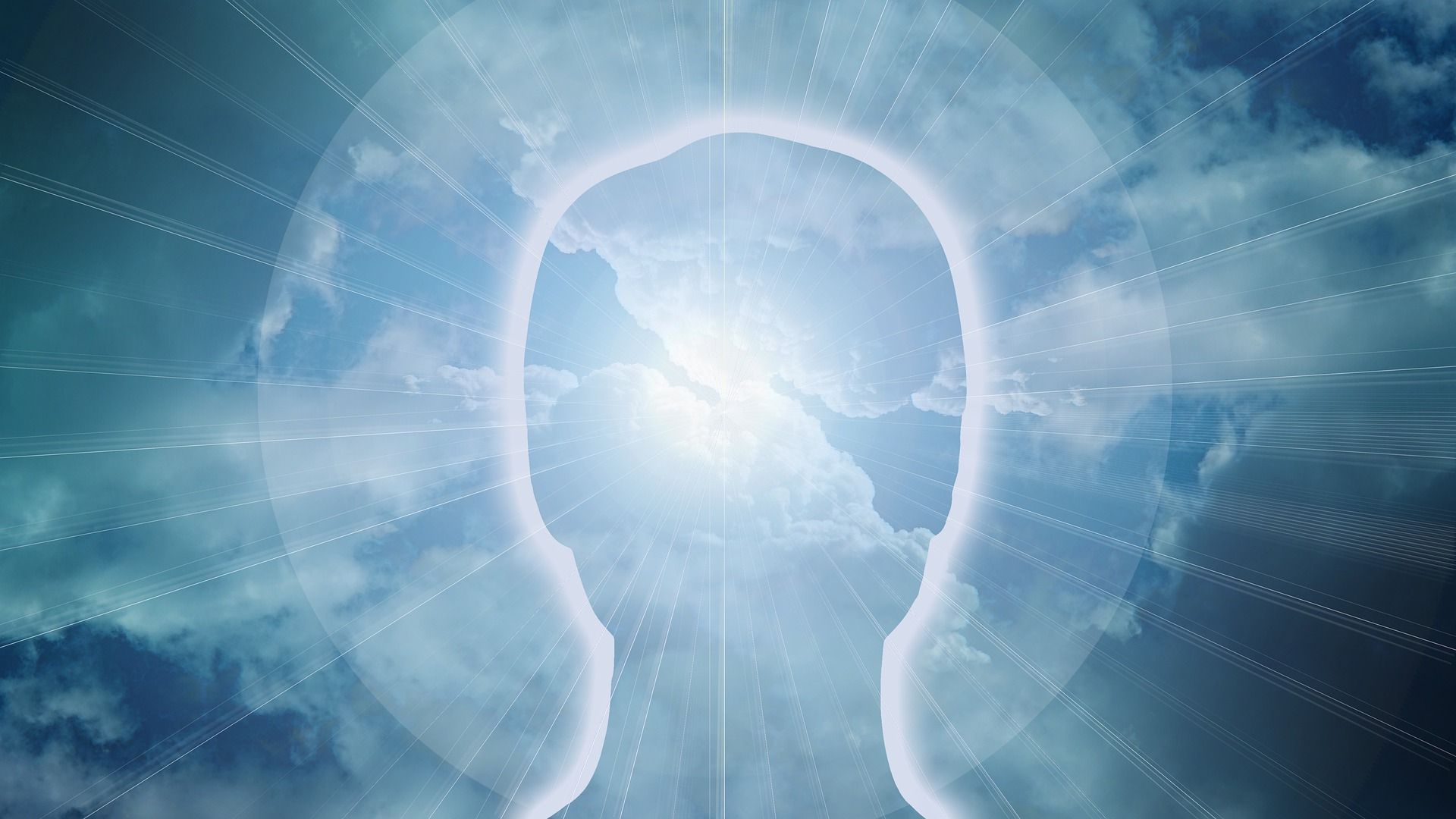
Important Insights from Related Books:
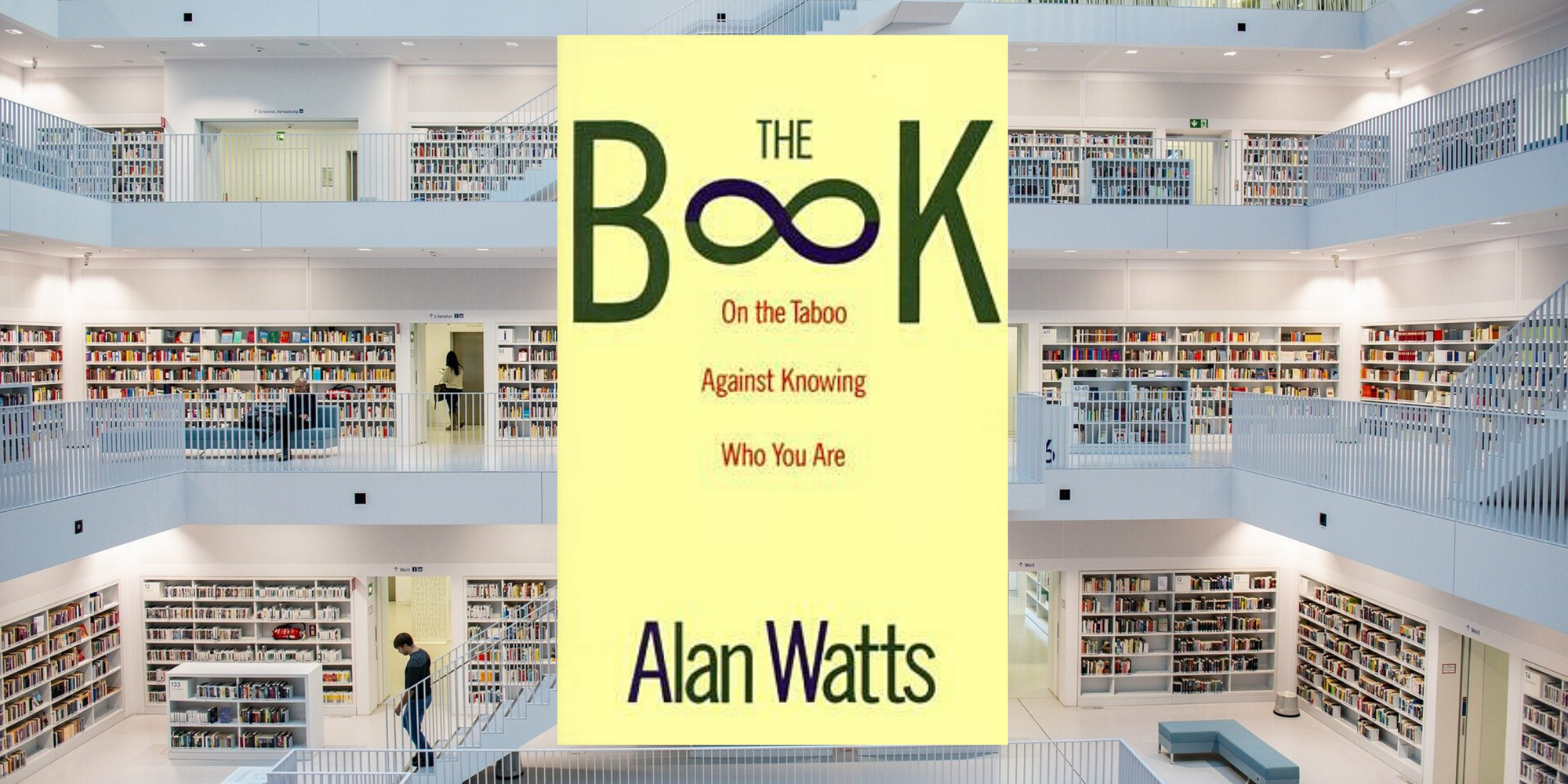
The Book, by Alan Watts:
You didn't come into the world; you came out of it. This should be the simplest, most obvious thing in the world, but it flies so directly in the face of our normal way of experiencing the world that we don't tend to notice it.
It's almost as if it were an unspoken taboo, something kept secret, yet vaguely known: that we are not separate from the universe, but are instead intimately bound up with it. You can think of it almost like a costume party where, although it's obvious that, just as the ocean creates waves, the universe creates people, no one wants to give up the game.
Ordinary experience leads us to believe that we are somehow like visitors on this earth, something contingent and that we don't quite belong. This way of thinking, Alan Watts teaches us, is an illusion.
Sample Quotes from the Book:
“How is it possible that a being with such sensitive jewels as the eyes, such enchanted musical instruments as the ears, and such fabulous arabesque of nerves as the brain can experience itself anything less than a god?”
“Irrevocable commitment to any religion is not only intellectual suicide; it is positive unfaith because it closes the mind to any new vision of the world. Faith is, above all, openness - an act of trust in the unknown.”
“Unless one is able to live fully in the present, the future is a hoax. There is no point whatever in making plans for a future which you will never be able to enjoy. When your plans mature, you will still be living for some other future beyond. You will never, never be able to sit back with full contentment and say, “Now, I’ve arrived!”
Read the Full Breakdown: The Book, by Alan Watts
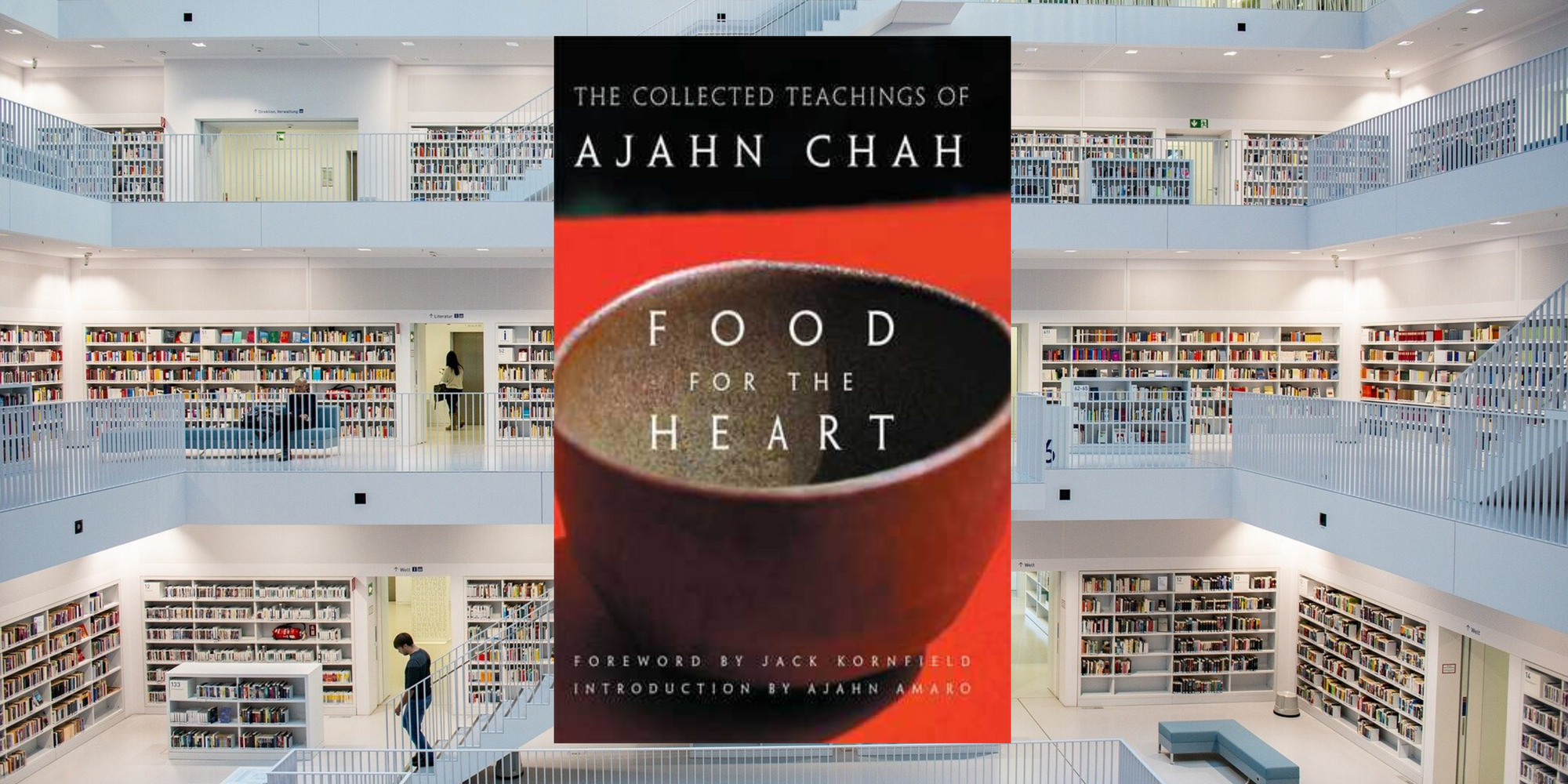
Food for the Heart, by Ajahn Chah:
Ajahn Chah is Thailand’s best-known meditation teacher, and I challenge you to look at this guy’s picture and not smile. It’s damn near impossible. In fact, I’d say that achieving enlightenment is probably easier than suppressing a smile when you look at any photo of Chah. It’s not that he’s particularly funny-looking or anything; it’s just that he positively radiates happiness, joy, and love of life.
Food for the Heart combines many of Chah’s most powerful teachings on meditation, calming the mind, dealing with people, and eliminating suffering. All classic Buddhist themes, of course.
At the end of it all, Chah just says, “Hey look, guys” - I’m paraphrasing, of course - “I’ve been learning this stuff as I go along, same as you, and I haven’t found too many answers. Everything is uncertain; suffering exists and it’s coming for you eventually; nobody really knows what the hell is going on. But there’s beauty and life and strength and love and awesomeness everywhere you look, and you’re going to miss it if you’re not right here, right now, living. So let’s dive in!”
Sample Quotes from the Book:
“Everything is uncertain. I’ve searched for over forty years as a monk and this is all I could find. That, and patient endurance.”
“Escaping from suffering means knowing the way out of suffering; it doesn't mean running away from wherever suffering arises. By doing that you just carry your suffering with you."
“If there’s a flood, let it only affect your house; don’t let it flood your mind. If there’s a fire, don’t let it burn your heart.”
Read the Full Breakdown: Food for the Heart, by Ajahn Chah

Discover the Immeasurable, by Jiddu Krishnamurti:
Discover the Immeasurable contains a series of six lectures given by J. Krishnamurti in the Fall of 1956, where he speaks about the inherently evil nature of authority, the constant flow of existence, and how the structure of our current society and even our own minds perpetuates needless conflict, misery, and tragedy.
His central idea here is that the "immeasurable," i.e. truth, reality, God, the universe, and the human mind, can never exist or function according to a fixed pattern. The universe is always changing and evolving, and truth is never stagnant. A mind burdened with the "known," as he would say, can never move beyond the strictures of society and discover truth, or reality.
It's about experiencing directly what is immeasurable, since "only direct experience has validity." We can't live according to theories but must flow with everything else that is going on in the universe and inside our own minds, which essentially amounts to the same thing.
It's not about going off into a cave by ourselves and working out some complex theory, but about realizing that the truth is revealed in every moment and in every relationship we have with everyone and everything else that exists.
Sample Quotes from the Book:
“The individual problem is the world problem. It is what we are as individuals that create society, society being the relationship between ourselves and others. I am speaking – and please believe it – as one individual to another, so that together we may understand the many problems that confront us.
I am not establishing myself as an authority to tell you what to do because I do not believe in authority in spiritual matters. All authority is evil, and all sense of authority must cease, especially if we would find out what is God, what is truth, whether there is something beyond the mere measure of the mind. That is why it is very important for the individual to understand himself.”
“After all, I can understand violence only when, with my whole mind, I give complete attention to the problem. And the moment I am wholly concerned with violence and the understanding of violence, what significance has the ideal of nonviolence?
It seems to me that the pursuit of the ideal is an evasion, a postponement. If I am to understand violence, I must give my whole mind to it and not allow myself to be distracted by the ideal of nonviolence.”
“To understand the immeasurable, the mind must be extraordinarily quiet, still; but if I think I am going to achieve stillness at some future date, I have destroyed the possibility of stillness. It is now or never. That is a very difficult thing to understand because we are all thinking of heaven in terms of time.”
Read the Full Breakdown: Discover the Immeasurable, by Jiddu Krishnamurti

G.I. Gurdjieff: The War Against Sleep, by Colin Wilson:
George Ivanovich Gurdjieff was one of the most charismatic, enigmatic, powerfully self-possessed mystical teachers of the 20th century, and this book is a short introduction to his life and work. Gurdjieff taught that most humans exist in a state of "waking sleep," where they remain unaware of their infinite potential and ultimate value as human beings.
His "System" (which he never claimed was the system, but simply a system, albeit a very effective one) was also known as "The Work," tending to mean "work on oneself." The Work was Gurdjieff's method of achieving higher consciousness and "keeping the mind awake." As such, his life and work can be thought of as the "war against sleep," i.e. sleepwalking through life and remaining unfulfilled, apathetic, and miserable.
The present book was written by Colin Wilson, one of the most important philosophers of the late-20th century, and he tells the fascinating story of Gurdjieff's arrival from seemingly nowhere to found an influential school of personal development and to show human beings all over the world that they were habitually living as inferior to their full selves.
This philosophy is about kicking everything about your life into high gear, but nobody is claiming that it's going to be easy. To realize how powerful we are, and how alive we can be, however, is to effect a revolutionary alteration in human consciousness. It really is like waking up.
Sample Quotes from the Book:
“If only we made the effort, we could achieve a degree of control over our feelings that would at present strike us as miraculous.”
"How is this to be done? According to Gurdjieff, the answer falls into two parts. First of all, a man must commit himself wholly and totally to the task of escaping his normal limitations; it requires the kind of commitment that made saints sit on top of pillars. Secondly, he must understand something of the workings of this complicated computer that houses the human spirit.”
“The problem, then, is clear: to increase the driving force. Man may be more than half mechanical; but he can choose whether to live in a blank, hypnotized state, or whether to live as though some immense unguessed meaning lay on the other side of this curtain of everyday reality, waiting to reveal itself to a sense of purpose. Gurdjieff’s ‘System’ is probably the greatest single-handed attempt in the history of human thought to make us aware of the potential of human consciousness. Whether he realized it or not, his life-work had achieved its purpose.”
Read the Full Breakdown: G.I. Gurdjieff: The War Against Sleep, by Colin Wilson
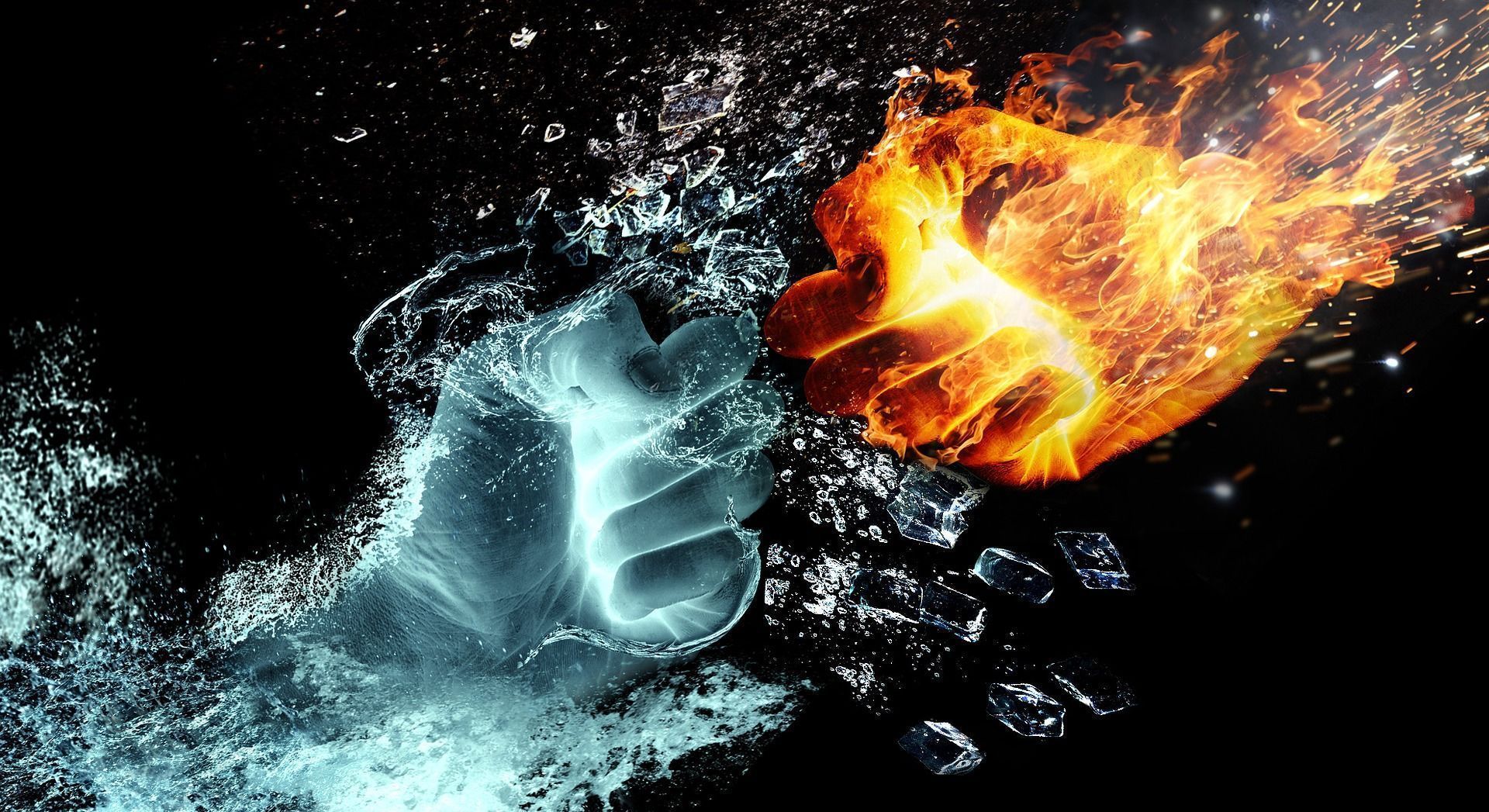
The View from the Opposition:
No one's ideas are beyond questioning. In this section, I argue the case for the opposition and raise some points you might wish to evaluate for yourself while reading this book.
#1: De Mello Has Selfishness Backwards
One thing I may object to in Awareness is de Mello's idea of "refined selfishness," his seeming dismissal of the idea that we can ever perform selfless acts for another's benefit.
He says that our core motive is really to make ourselves feel good, which, even if that were true...it just seems like he's dismissing the whole idea of being charitable.
Against that view, I would say that instead of being cynical about the fact that we do good things to make ourselves feel good, we should be amazed that there exists something in human beings that make us feel good when we help other people! Don't feel bad just because helping others makes you feel good. I think that's backward.
"The test of a first-rate intelligence is the ability to hold two opposed ideas in the mind at the same time and still retain the ability to function.”
-F. Scott Fitzgerald
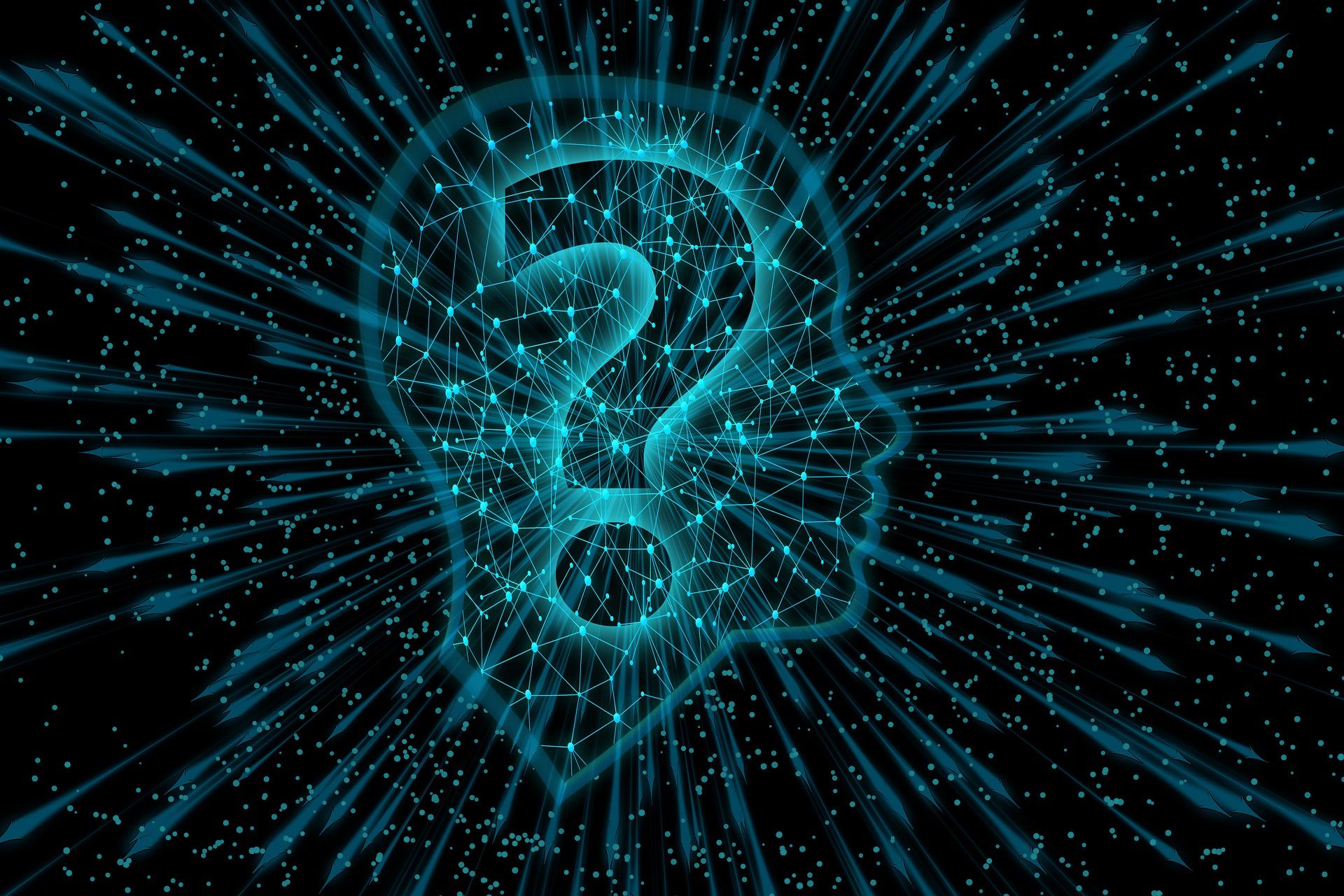
Questions to Stimulate Your Thinking:
#1: Is my view of reality accurate? How would I be able to know?
#2: What do I really fear? Is it a surface fear, or does it point to a deeper fear of which I may be unaware?
#3: What am I trying to possess by holding on to it? Am I able to let it go and still feel connected to it?

Action Steps:
So you've finished reading. What do you do now?
Reading for pleasure is great, and I wholeheartedly support it. However, I am intensely practical when I'm reading for a particular purpose. I want a result. I want to take what I've learned and apply it to my one and only life to make it better!
Because that's really what the Great Books all say. They all say: "You must change your life!" So here, below, are some suggestions for how you can apply the wisdom found in this breakdown to improve your actual life.
Please commit to taking massive action on this immediately! Acting on what you've learned here today will also help you solidify it in your long-term memory. So there's a double benefit! Let's begin...
#1: Don't "Do" Anything
“When you renounce something, you're stuck to it forever. When you fight something, you're tied to it forever. As long as you're fighting it, you are giving it power. You give it as much power as you are using to fight it."
You don't have to "do" anything to become "enlightened" or whatever you think you want to become. Peace and happiness...enlightenment...is your natural state, and all you have to do is let drop all the obstructions that are clouding your vision of Reality. You don't have to do anything! Striving for something implies that you don't already have it when in reality, awareness is something that you've always had.
#2: Turn on the Light of Awareness
“The only way someone can be of help to you is in challenging your ideas. If you’re ready to listen and if you’re ready to be challenged, there’s one thing that you can do, but no one can help you.
What is this most important thing of all? It’s called self-observation. No one can help you there. No one can give you a method. No one can show you a technique. The moment you pick up a technique, you’re programmed again.
But self-observation—watching yourself—is important. It is not the same as self-absorption. Self-absorption is self-preoccupation, where you’re concerned about yourself, worried about yourself. I’m talking about self-observation.
What’s that? It means to watch everything in you and around you as far as possible and watch it as if it were happening to someone else. What does that last sentence mean? It means that you do not personalize what is happening to you. It means that you look at things as if you have no connection with them whatsoever.”
#3: Get into Today
When you enjoy something intensely, you need very little of it. It's because we've forgotten how to enjoy life that we're always looking for more, more, more. When you really get into today - when you live now, immediately - today is enough.
There are numerous ways you could do this, but it helps most of all to simply slow down. Tomorrow's problems will arrive tomorrow, but when you give your full focus and attention to today, and what you're doing right now, then tomorrow tends to turn out alright.
#4: Four More Steps to Wisdom
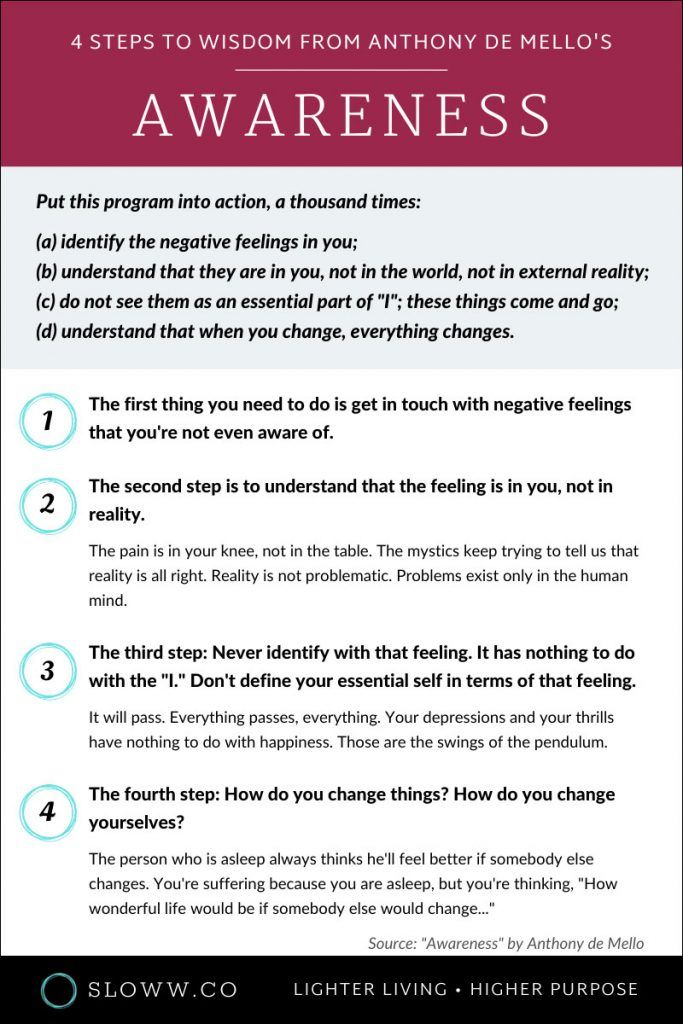

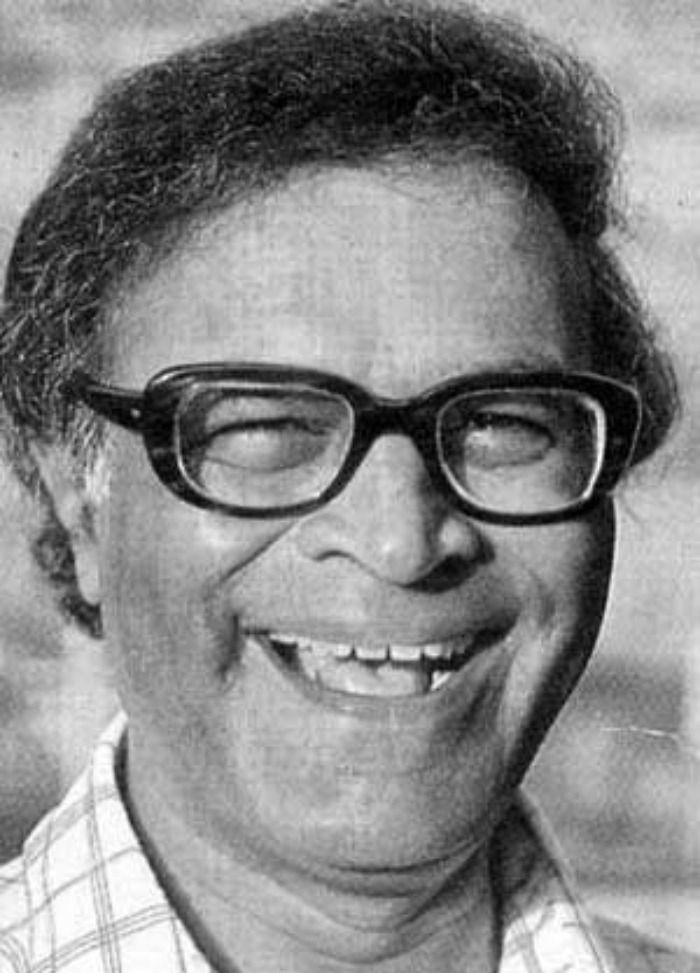
About the Author:
Anthony de Mello was the director of the Sadhana Institute of Pastoral Counseling in Poona, India. A member of the Jesuit province of Bombay, he was widely known in English- and Spanish-speaking countries for his retreats, workshops, seminars on prayer, and therapy courses - work in which he was involved for over eighteen years around the world. Though he died suddenly in 1987, he leaves a rich legacy of spiritual teaching through his written and recorded words.
Additional Resources:
De-Mello-Spirituality.com | Main Website
Anthony de Mello - Recognize Your Programming
Anthony de Mello - Stop Fixing Yourself
Anthony de Mello - Live Happily
The Root of Sorrow is Attachment - YouTube
Philosopher's Notes: Awareness - YouTube
Sloww.co Book Summary - Awareness
This Book on Amazon:
Awareness, by Anthony de Mello
If You Liked This Book:
The Way to Love, by Anthony de Mello
Stop Fixing Yourself, by Anthony de Mello
The Wisdom of Insecurity, by Alan Watts
The Power of Now, by Eckhart Tolle
The Untethered Soul, by Michael A. Singer
The Revolution from Within, by Jiddu Krishnamurti
Discover the Immeasurable, by Jiddu Krishnamurti
